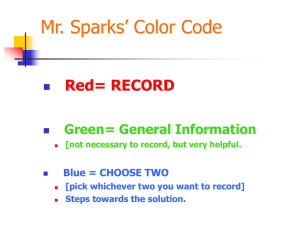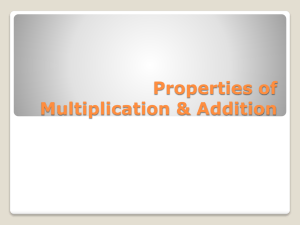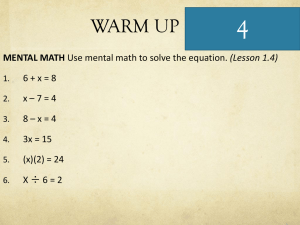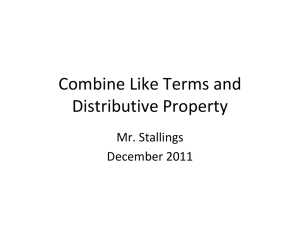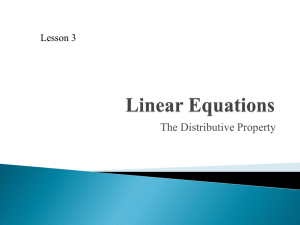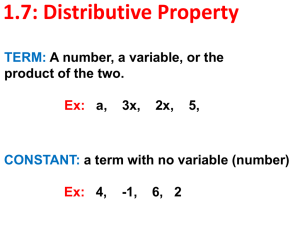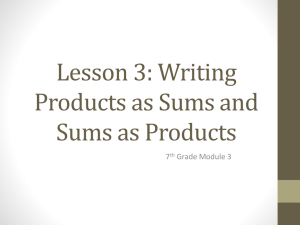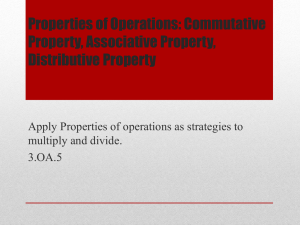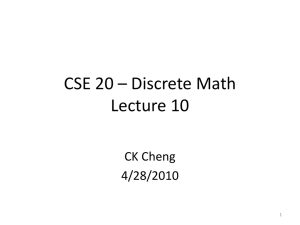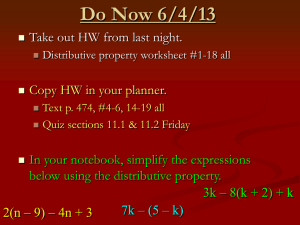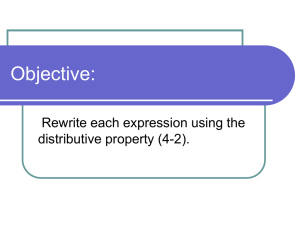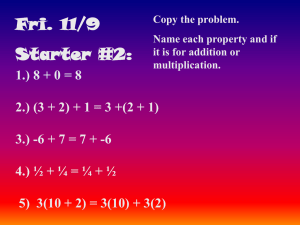Algebra_1A_files/Lecture 2-6
advertisement
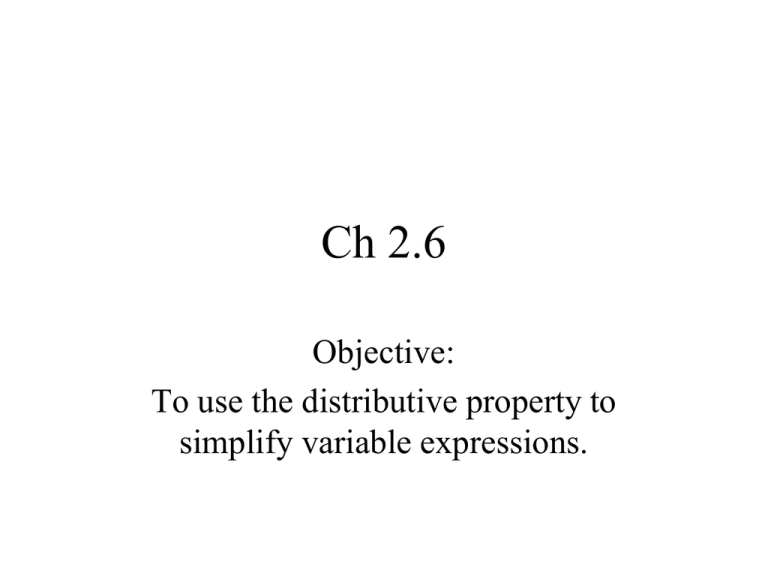
Ch 2.6 Objective: To use the distributive property to simplify variable expressions. Property Distributive Property The distributive property is used when multiplying an expression with a group of expressions that are added (or subtracted). For example: a(b + c) = a(b) + a(c) a(b - c) = a(b) - a(c) (b + c)a = (b)a + (c)a (b - c)a = (b)a - (c)a USE THE DISTRIBUTIVE PROPERTY THE DISTRIBUTIVE PROPERTY The product of a and (b + c): = 2(x) + 2(5) = 2x + 10 a(b + c) = ab + ac 2(x + 5) (b + c)a = ba + ca (x + 5)2 = (x)2 + (5)2 = 2x + 10 y(1 – y) = y(1) – y(y) 2 y – y = (1 + 5x)2 = (1)2 + (5x)2 = 2 + 10x Comparison Order of Operations 6(3 + 5) Distributive Property 6(3 + 5) 6(8) 6(3) + 6(5) 48 18 + 30 48 Why distribute when order of operations is faster ? Use Distributive Property when there is a variable Use Order of Operation to “check” your answer Use the distributive property to simplify. 1) 3(x + 7) 6) x(a + m) 3x + 21 ax + mx 2) 2(a - 4) 7) -4(3 - r) 2a - 8 -12 + 4r 3) -7(8 - m) 8) 2(x - 8) -56 + 7m 2x - 16 4) 3(4 - a) 9) -1(2m - 3) 12 - 3a -2m + 3 5) (3 - k)5 10) (6 - 2y)3 15 - 5k 18 - 6y USE THE DISTRIBUTIVE PROPERTY Remember that a factor must multiply EACH term of an expression. (–3)(1 + x) = (–3)(1) + (–3)(x) = –3 – 3x (y – 5)(–2) = (y)(–2) + (–5)(–2) = –2y + 10 – (7 – 3x) = (–1)(7) + (–1)(–3x) = –7 + 3x Forgetting to distribute the negative sign when multiplying by a negative factor is a common error. Use the distributive property to simplify. 1) 4(y - 7) 6) a(c + d) 4y - 28 ac + ad 2) 3(b + 4) 7) - (-3 - r) 3b + 12 3+r 3) -5(9 - m) 8) 4(x - 8) -45 + 5m 4x - 32 4) 5(4 - a) 9) - (2m + 3) 20 - 5a -2m - 3 5) (7 - k)6 10) (6 - 2y) -3y 42 - 6k 6 - 2y -3y MENTAL MATH CALCULATIONS You are shopping for CDs. You want to buy six CDs for $11.95 each. 6(11.95) = 6(12 – 0.05) = 6(12) – 6(0.05) = 72 – 0.30 = 71.70 Use the distributive property to calculate the total cost mentally. The mental math is easier if you think of $11.95 as $12.00 – $.05. Write 11.95 as a difference. Use the distributive property. Find the products mentally. Find the difference mentally. The total cost of 6 CDs at $11.95 each is $71.70. SIMPLIFYING BY COMBINING LIKE TERMS (8 + 3)x = 8x + 3x = 11x 4x2 + 2 – x2 = 4x2 – x2 + 2 = 3x2 + 2 Use the distributive property. Add coefficients. Group like terms. Combine like terms. 3 – 2(4 + x) = 3 + (–2)(4 + x) Rewrite as addition expression. = 3 + [(–2)(4) + (–2)(x)] Distribute the –2. = 3 + (–8) + (–2x) Multiply. = –5 + (–2x) Combine like terms and simplify = –5 – 2x Designate one sign in front of 2x Subtracting a Quantity 1) -(x + 6) -x - 6 2) -(2x - 8) -2x + 8 3) 10- (4m + 3) 10 - 4m - 3 - 4m + 7 4) 2(x - 5) - (x - 3) 2x - 10 - x + 3 x-7 5) -(3a + 1) -3a - 1 2 6) -(-3x + 2x -7) 2 +3x - 2x + 7 7) -12 - (3y - 8) -12 - 3y + 8 - 3y - 4 8) 4(3k - 5) - (2k + 9) 12k - 20 - 2k - 9 10k - 29 Geometric Model for Area 3 + 7 4 4(3) 4(7) Two ways to find the total area. Width by total length (Order of Operations) Sum of smaller rectangles (Distributive Property) 4(3 + 7) = 4 (10) 40 = = 4(3) + 4(7) 12 + 28 40 Geometric Model for Distributive Property 4 x 9 Two ways to find the total area. Width by total length 9(4 + x) Sum of smaller rectangles = 9(4) + 9(x)
